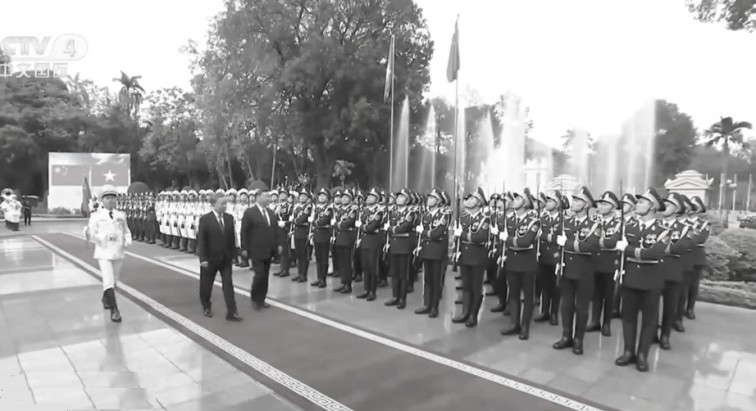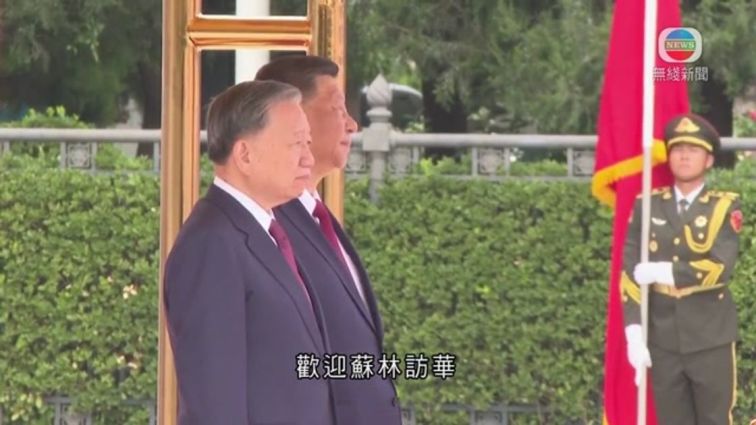On March 5, 2025, PLA delegates arrive at the Great Hall of the People in Beijing to attend the opening of the National People's Congress. (Photo by Kevin Frayer/Getty Images)
[People News] Recently, rumours have been swirling that Xi Jinping will step down during the upcoming Fourth Plenary Session. Given the CCP's mantra that "political power grows out of the barrel of a gun," if the rumours are true, it would signify that Xi has completely lost control of the military. Of the 79 generals Xi has promoted since coming to power, 22 have either been officially purged or rumoured to have fallen. Notably, the fall of Miao Hua and the disappearance of He Weidong essentially confirm Xi’s dwindling influence over the military. The recent announcement by China’s Ministry of National Defence of the reorganisation and establishment of three new military academies is another sign pointing to Xi’s loss of military authority.
New Military Universities Announced Without Mention of Xi Jinping
On the afternoon of May 15, the Ministry of National Defence announced that the Central Military Commission (CMC) had decided to reorganise and establish three military academies: the Army Branches University, the Information Support Force Engineering University, and the Joint Logistics Support Force Engineering University. These institutions will begin recruiting regular high school graduates starting this year.
Colonel Jiang Bin, Deputy Director of the Defence Ministry’s News Bureau and the new spokesperson, stated that the reorganisation was to “implement the spirit of the 20th CCP Central Committee’s Third Plenary Session and to meet the structural needs of the military and talent cultivation.” Jiang explicitly stated that the decision was made by the Central Military Commission, conspicuously omitting Xi Jinping’s name. Nor was there any reference to “Xi Jinping’s Thought on Strengthening the Military”, a term often used to signify Xi’s command over the armed forces. State-run Xinhua News Agency and other major media outlets also avoided mentioning Xi Jinping or his military ideology in their reports.
In the CCP system, military and police academies are under vertical control of relevant ministries, with decisions about admissions, curriculum, staffing, and infrastructure made strictly according to the CCP's military strategy. Thus, the restructuring of military academies reveals both the long-term military strategic direction and internal power shifts within the military leadership.
During Xi Jinping’s 2017 military reforms, military academies were classified into four levels: theatre command deputy level, corps level, corps deputy level, and division level. The National Defence University in Beijing is at the theatre command deputy level; the National University of Defence Technology in Changsha is corps level, both directly under the Central Military Commission. The Academy of Military Sciences, another research institution directly under the CMC, is also at the theatre command deputy level.
Military branch academies established after the 2017 reform, such as command colleges, engineering universities, aviation academies, military medical universities, and logistics colleges, are mostly at the corps deputy level. NCO (non-commissioned officer) schools fall under the division level. These institutions are typically subordinate to their respective branches.
The three new academies—Army Branches University, Information Support Force Engineering University, and Joint Logistics Support Force Engineering University—are expected to be at least corps deputy or corps-level institutions. The Army Branches University would fall under the Army; the Information Support Force University under the newly established Information Support Force, a CMC-level branch; and the Logistics Engineering University under the Joint Logistics Support Force, also a CMC-level branch.
Tea Grows Cold Before the Guest Has Left – Xi's Loss of Power is Clear
In contrast, when the restructured Academy of Military Sciences, National Defence University, and National University of Defence Technology were inaugurated on July 19, 2017, Xi Jinping personally attended the high-profile ceremony at the Bayi Building in Beijing. He awarded flags, delivered speeches, and hosted a symposium — all intended to assert his tight grip on military power and showcase his strategic vision for military reform.
In November 2019, Xi also opened a military academy leaders' training session at the National Defence University and gave a keynote address, reinforcing his focus on talent development and military education. In June 2020, Xi signed and issued the revised Military Academies Education Regulations (Trial), which, according to Xinhua, deeply embodied “Xi Jinping’s Thought on Strengthening the Military” and “military education for war.”
At the time, Xi stood at the peak of his power, culminating in his unprecedented third term at the 20th Party Congress. However, the tide turned when a sweeping corruption scandal engulfed the Rocket Force, which Xi had built and relied upon. In 2024, he abruptly dismantled the Strategic Support Force, another of his creations, replacing it with the new Information Support Force.
On April 19, 2024, Xi again appeared at the Bayi Building to present a flag to the newly formed Information Support Force. While his speech stressed “absolute loyalty, purity, and reliability,” his sombre demeanour, furrowed brows, and anxious tone betrayed his waning control. Trusted generals like He Weidong and Miao Hua still flanked him then.
Yet within a year, Xi’s authority and prestige crumbled like a house of cards. After the Third Plenum, Zhang Youxia mounted a counteroffensive, allegedly teaming up with anti-Xi elders and second-generation "Red Princelings" to purge Xi’s military allies. Amid escalating U.S.-China tensions and Donald Trump’s return to the U.S. presidency, Xi's confrontational foreign policy further intensified internal discontent and fear of regime collapse. The purge of Organisation Department Minister Li Ganjie and the rise of Shi Taifeng marked a resurgence of the Hu-Wen reformist faction, suggesting a near-inevitable shift in power.
Now, with the military restructuring, Xi is nowhere to be seen. Neither the military nor Party media mention him or his ideology. The message is unmistakable — the man has fallen, but the tea has already gone cold. The omission of his name is a clear signal that Xi Jinping has lost control of the military.
Zhang Youxia Takes Control, Lays Groundwork for Military Talent
It’s worth noting the strong connections between the three new academies and Zhang Youxia’s sphere of influence.
Zhang, a career Army officer, naturally oversees the new Army Branches University, which merges the former Armoured Forces Academy and the Artillery & Air Defence Academy in Hefei (Eastern Theatre Command). As the only military university specialising in core combat branches, this strengthens the Army’s foundational role and consolidates Zhang’s base of power.
The Information Support Force Engineering University, set to launch in 2025, merges the Information and Communication College of the National University of Defence Technology (a CMC-level institution) and the Signal NCO School of the Army Engineering University. Located in Changsha (Central Theatre Command), it indicates a strategic move by the Army to expand its influence into the new branch of the Information Support Force — clearly Zhang’s handiwork.
Similarly, the Joint Logistics Support Force Engineering University, formed in May 2025 by merging the Army Logistics College and Military Transportation College, is headquartered in Chongqing, with campuses in Tianjin, Chongqing, and Bengbu, covering multiple theatres. As a military talent hub in logistics and engineering, it too reflects the Army’s strategic crossover into CMC-level units — again bolstering Zhang Youxia’s reach.
All three universities reveal Zhang’s comprehensive plan for cultivating military talent: fortifying the Army, while extending its influence into other branches, especially the Information Support Force — a hub for joint operations and digital warfare. This shows Zhang’s growing influence over multi-branch military cooperation.
From Spokesperson Replacement, Signs of De-Xi-ification in the Military
Another major signal: on May 15, a new military spokesperson, Colonel Jiang Bin, replaced Colonel Wu Qian, who had held the position for a decade, coinciding with Xi Jinping’s peak years.
Since the Defence Ministry’s first spokesperson, Hu Changming, debuted in May 2008, there have been nine in total, including Hu, Huang Xueping, Geng Yansheng, Yang Yujun, Wu Qian, Ren Guoqiang, Tan Kefei, Zhang Xiaogang, and Jiang Bin. Wu Qian served the longest.
Wu was known for his “wolf warrior” style that rivalled the Foreign Ministry’s. At a press conference on February 27, 2025, he warned Taiwan’s ruling DPP, “Like a mantis trying to stop a chariot, you’ll only destroy yourselves. Sooner or later, we’ll take you.” His rhetoric was seen as laying bare Xi’s ambition to forcefully unify Taiwan.
However, in recent remarks regarding rumours about General He Weidong’s downfall, Wu gave vague and evasive answers, indirectly fueling speculation about military infighting and Xi’s loss of control.
At a time of fierce internal power struggles, Wu’s quiet exit signals a shift in how the military wants to present itself externally: less flamboyance, more restraint. The goal is to reduce national and international controversy and avoid further destabilising the regime. In essence, this reflects a strategic move away from “wolf warrior” diplomacy and from Xi Jinping’s personal cult, which may become the new norm in the military’s political logic going forward.
(Originally published by People News)










News magazine bootstrap themes!
I like this themes, fast loading and look profesional
Thank you Carlos!
You're welcome!
Please support me with give positive rating!
Yes Sure!